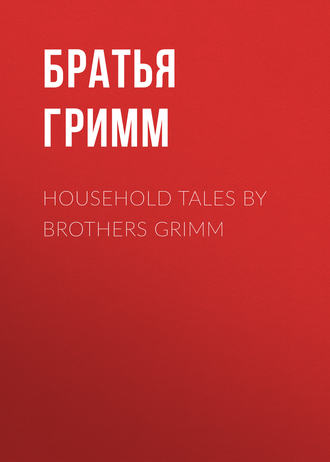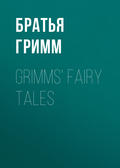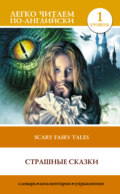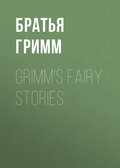
Братья Гримм
Household Tales by Brothers Grimm
1 The Frog-King, or Iron Henry
In old times when wishing still helped one, there lived a king whose daughters were all beautiful, but the youngest was so beautiful that the sun itself, which has seen so much, was astonished whenever it shone in her face. Close by the King's castle lay a great dark forest, and under an old lime-tree in the forest was a well, and when the day was very warm, the King's child went out into the forest and sat down by the side of the cool fountain, and when she was dull she took a golden ball, and threw it up on high and caught it, and this ball was her favorite plaything.
Now it so happened that on one occasion the princess's golden ball did not fall into the little hand which she was holding up for it, but on to the ground beyond, and rolled straight into the water. The King's daughter followed it with her eyes, but it vanished, and the well was deep, so deep that the bottom could not be seen. On this she began to cry, and cried louder and louder, and could not be comforted. And as she thus lamented some one said to her, "What ails thee, King's daughter? Thou weepest so that even a stone would show pity." She looked round to the side from whence the voice came, and saw a frog stretching forth its thick, ugly head from the water. "Ah! old water-splasher, is it thou?" said she; "I am weeping for my golden ball, which has fallen into the well."
"Be quiet, and do not weep," answered the frog, "I can help thee, but what wilt thou give me if I bring thy plaything up again?" "Whatever thou wilt have, dear frog," said she – "My clothes, my pearls and jewels, and even the golden crown which I am wearing."
The frog answered, "I do not care for thy clothes, thy pearls and jewels, or thy golden crown, but if thou wilt love me and let me be thy companion and play-fellow, and sit by thee at thy little table, and eat off thy little golden plate, and drink out of thy little cup, and sleep in thy little bed – if thou wilt promise me this I will go down below, and bring thee thy golden ball up again."
"Oh yes," said she, "I promise thee all thou wishest, if thou wilt but bring me my ball back again." She, however, thought, "How the silly frog does talk! He lives in the water with the other frogs, and croaks, and can be no companion to any human being!"
But the frog when he had received this promise, put his head into the water and sank down, and in a short while came swimmming up again with the ball in his mouth, and threw it on the grass. The King's daughter was delighted to see her pretty plaything once more, and picked it up, and ran away with it. "Wait, wait," said the frog. "Take me with thee. I can't run as thou canst." But what did it avail him to scream his croak, croak, after her, as loudly as he could? She did not listen to it, but ran home and soon forgot the poor frog, who was forced to go back into his well again.
The next day when she had seated herself at table with the King and all the courtiers, and was eating from her little golden plate, something came creeping splish splash, splish splash, up the marble staircase, and when it had got to the top, it knocked at the door and cried, "Princess, youngest princess, open the door for me." She ran to see who was outside, but when she opened the door, there sat the frog in front of it. Then she slammed the door to, in great haste, sat down to dinner again, and was quite frightened. The King saw plainly that her heart was beating violently, and said, "My child, what art thou so afraid of? Is there perchance a giant outside who wants to carry thee away?" "Ah, no," replied she. "It is no giant but a disgusting frog."
"What does a frog want with thee?" "Ah, dear father, yesterday as I was in the forest sitting by the well, playing, my golden ball fell into the water. And because I cried so, the frog brought it out again for me, and because he so insisted, I promised him he should be my companion, but I never thought he would be able to come out of his water! And now he is outside there, and wants to come in to me."
In the meantime it knocked a second time, and cried,
"Princess! youngest princess!
Open the door for me!
Dost thou not know what thou saidst to me
Yesterday by the cool waters of the fountain?
Princess, youngest princess!
Open the door for me!"
Then said the King, "That which thou hast promised must thou perform. Go and let him in." She went and opened the door, and the frog hopped in and followed her, step by step, to her chair. There he sat and cried, "Lift me up beside thee." She delayed, until at last the King commanded her to do it. When the frog was once on the chair he wanted to be on the table, and when he was on the table he said, "Now, push thy little golden plate nearer to me that we may eat together." She did this, but it was easy to see that she did not do it willingly. The frog enjoyed what he ate, but almost every mouthful she took choked her. At length he said, "I have eaten and am satisfied; now I am tired, carry me into thy little room and make thy little silken bed ready, and we will both lie down and go to sleep."
The King's daughter began to cry, for she was afraid of the cold frog which she did not like to touch, and which was now to sleep in her pretty, clean little bed. But the King grew angry and said, "He who helped thee when thou wert in trouble ought not afterwards to be despised by thee." So she took hold of the frog with two fingers, carried him upstairs, and put him in a corner. But when she was in bed he crept to her and said, "I am tired, I want to sleep as well as thou, lift me up or I will tell thy father." Then she was terribly angry, and took him up and threw him with all her might against the wall. "Now, thou wilt be quiet, odious frog," said she. But when he fell down he was no frog but a King's son with beautiful kind eyes. He by her father's will was now her dear companion and husband. Then he told her how he had been bewitched by a wicked witch, and how no one could have delivered him from the well but herself, and that to-morrow they would go together into his kingdom. Then they went to sleep, and next morning when the sun awoke them, a carriage came driving up with eight white horses, which had white ostrich feathers on their heads, and were harnessed with golden chains, and behind stood the young King's servant Faithful Henry. Faithful Henry had been so unhappy when his master was changed into a frog, that he had caused three iron bands to be laid round his heart, lest it should burst with grief and sadness. The carriage was to conduct the young King into his Kingdom. Faithful Henry helped them both in, and placed himself behind again, and was full of joy because of this deliverance. And when they had driven a part of the way the King's son heard a cracking behind him as if something had broken. So he turned round and cried, "Henry, the carriage is breaking."
"No, master, it is not the carriage. It is a band from my heart, which was put there in my great pain when you were a frog and imprisoned in the well." Again and once again while they were on their way something cracked, and each time the King's son thought the carriage was breaking; but it was only the bands which were springing from the heart of faithful Henry because his master was set free and was happy.
2 Cat and Mouse in Partnership
A certain cat had made the acquaintance of a mouse, and had said so much to her about the great love and friendship she felt for her, that at length the mouse agreed that they should live and keep house together. "But we must make a provision for winter, or else we shall suffer from hunger," said the cat, "and you, little mouse, cannot venture everywhere, or you will be caught in a trap some day." The good advice was followed, and a pot of fat was bought, but they did not know where to put it. At length, after much consideration, the cat said, "I know no place where it will be better stored up than in the church, for no one dares take anything away from there. We will set it beneath the altar, and not touch it until we are really in need of it." So the pot was placed in safety, but it was not long before the cat had a great yearning for it, and said to the mouse, "I want to tell you something, little mouse; my cousin has brought a little son into the world, and has asked me to be godmother; he is white with brown spots, and I am to hold him over the font at the christening. Let me go out to-day, and you look after the house by yourself." "Yes, yes," answered the mouse, "by all means go, and if you get anything very good, think of me, I should like a drop of sweet red christening wine too." All this, however, was untrue; the cat had no cousin, and had not been asked to be godmother. She went straight to the church, stole to the pot of fat, began to lick at it, and licked the top of the fat off. Then she took a walk upon the roofs of the town, looked out for opportunities, and then stretched herself in the sun, and licked her lips whenever she thought of the pot of fat, and not until it was evening did she return home. "Well, here you are again," said the mouse, "no doubt you have had a merry day." "All went off well," answered the cat. "What name did they give the child?" "Top off!" said the cat quite coolly. "Top off!" cried the mouse, "that is a very odd and uncommon name, is it a usual one in your family?" "What does it signify," said the cat, "it is no worse than Crumb-stealer, as your god-children are called."
Before long the cat was seized by another fit of longing. She said to the mouse, "You must do me a favour, and once more manage the house for a day alone. I am again asked to be godmother, and, as the child has a white ring round its neck, I cannot refuse." The good mouse consented, but the cat crept behind the town walls to the church, and devoured half the pot of fat. "Nothing ever seems so good as what one keeps to oneself," said she, and was quite satisfied with her day's work. When she went home the mouse inquired, "And what was this child christened?" "Half-done," answered the cat. "Half-done! What are you saying? I never heard the name in my life, I'll wager anything it is not in the calendar!"
The cat's mouth soon began to water for some more licking. "All good things go in threes," said she, "I am asked to stand godmother again. The child is quite black, only it has white paws, but with that exception, it has not a single white hair on its whole body; this only happens once every few years, you will let me go, won't you?" "Top-off! Half-done!" answered the mouse, "they are such odd names, they make me very thoughtful." "You sit at home," said the cat, "in your dark-grey fur coat and long tail, and are filled with fancies, that's because you do not go out in the daytime." During the cat's absence the mouse cleaned the house, and put it in order but the greedy cat entirely emptied the pot of fat. "When everything is eaten up one has some peace," said she to herself, and well filled and fat she did not return home till night. The mouse at once asked what name had been given to the third child. "It will not please you more than the others," said the cat. "He is called All-gone." "All-gone," cried the mouse, "that is the most suspicious name of all! I have never seen it in print. All-gone; what can that mean?" and she shook her head, curled herself up, and lay down to sleep.
From this time forth no one invited the cat to be god-mother, but when the winter had come and there was no longer anything to be found outside, the mouse thought of their provision, and said, "Come cat, we will go to our pot of fat which we have stored up for ourselves – we shall enjoy that." "Yes," answered the cat, "you will enjoy it as much as you would enjoy sticking that dainty tongue of yours out of the window." They set out on their way, but when they arrived, the pot of fat certainly was still in its place, but it was empty. "Alas!" said the mouse, "now I see what has happened, now it comes to light! You are a true friend! You have devoured all when you were standing godmother. First top off, then half done, then – ." "Will you hold your tongue," cried the cat, "one word more and I will eat you too." "All gone" was already on the poor mouse's lips; scarcely had she spoken it before the cat sprang on her, seized her, and swallowed her down. Verily, that is the way of the world.
3 Our Lady's Child
Hard by a great forest dwelt a wood-cutter with his wife, who had an only child, a little girl three years old. They were so poor, however, that they no longer had daily bread, and did not know how to get food for her. One morning the wood-cutter went out sorrowfully to his work in the forest, and while he was cutting wood, suddenly there stood before him a tall and beautiful woman with a crown of shining stars on her head, who said to him, "I am the Virgin Mary, mother of the child Jesus. Thou art poor and needy, bring thy child to me, I will take her with me and be her mother, and care for her." The wood-cutter obeyed, brought his child, and gave her to the Virgin Mary, who took her up to heaven with her. There the child fared well, ate sugar-cakes, and drank sweet milk, and her clothes were of gold, and the little angels played with her. And when she was fourteen years of age, the Virgin Mary called her one day and said, "Dear child, I am about to make a long journey, so take into thy keeping the keys of the thirteen doors of heaven. Twelve of these thou mayest open, and behold the glory which is within them, but the thirteenth, to which this little key belongs, is forbidden thee. Beware of opening it, or thou wilt bring misery on thyself." The girl promised to be obedient, and when the Virgin Mary was gone, she began to examine the dwellings of the kingdom of heaven. Each day she opened one of them, until she had made the round of the twelve. In each of them sat one of the Apostles in the midst of a great light, and she rejoiced in all the magnificence and splendour, and the little angels who always accompanied her rejoiced with her. Then the forbidden door alone remained, and she felt a great desire to know what could be hidden behind it, and said to the angels, "I will not quite open it, and I will not go inside it, but I will unlock it so that we can just see a little through the opening." "Oh no," said the little angels, "that would be a sin. The Virgin Mary has forbidden it, and it might easily cause thy unhappiness." Then she was silent, but the desire in her heart was not stilled, but gnawed there and tormented her, and let her have no rest. And once when the angels had all gone out, she thought, "Now I am quite alone, and I could peep in. If I do it, no one will ever know." She sought out the key, and when she had got it in her hand, she put it in the lock, and when she had put it in, she turned it round as well. Then the door sprang open, and she saw there the Trinity sitting in fire and splendour. She stayed there awhile, and looked at everything in amazement; then she touched the light a little with her finger, and her finger became quite golden. Immediately a great fear fell on her. She shut the door violently, and ran away. Her terror too would not quit her, let her do what she might, and her heart beat continually and would not be still; the gold too stayed on her finger, and would not go away, let her rub it and wash it never so much.
It was not long before the Virgin Mary came back from her journey. She called the girl before her, and asked to have the keys of heaven back. When the maiden gave her the bunch, the Virgin looked into her eyes and said, "Hast thou not opened the thirteenth door also?" "No," she replied. Then she laid her hand on the girl's heart, and felt how it beat and beat, and saw right well that she had disobeyed her order and had opened the door. Then she said once again, "Art thou certain that thou hast not done it?" "Yes," said the girl, for the second time. Then she perceived the finger which had become golden from touching the fire of heaven, and saw well that the child had sinned, and said for the third time "Hast thou not done it?" "No," said the girl for the third time. Then said the Virgin Mary, "Thou hast not obeyed me, and besides that thou hast lied, thou art no longer worthy to be in heaven."
Then the girl fell into a deep sleep, and when she awoke she lay on the earth below, and in the midst of a wilderness. She wanted to cry out, but she could bring forth no sound. She sprang up and wanted to run away, but whithersoever she turned herself, she was continually held back by thick hedges of thorns through which she could not break. In the desert, in which she was imprisoned, there stood an old hollow tree, and this had to be her dwelling-place. Into this she crept when night came, and here she slept. Here, too, she found a shelter from storm and rain, but it was a miserable life, and bitterly did she weep when she remembered how happy she had been in heaven, and how the angels had played with her. Roots and wild berries were her only food, and for these she sought as far as she could go. In the autumn she picked up the fallen nuts and leaves, and carried them into the hole. The nuts were her food in winter, and when snow and ice came, she crept amongst the leaves like a poor little animal that she might not freeze. Before long her clothes were all torn, and one bit of them after another fell off her. As soon, however, as the sun shone warm again, she went out and sat in front of the tree, and her long hair covered her on all sides like a mantle. Thus she sat year after year, and felt the pain and the misery of the world. One day, when the trees were once more clothed in fresh green, the King of the country was hunting in the forest, and followed a roe, and as it had fled into the thicket which shut in this part of the forest, he got off his horse, tore the bushes asunder, and cut himself a path with his sword. When he had at last forced his way through, he saw a wonderfully beautiful maiden sitting under the tree; and she sat there and was entirely covered with her golden hair down to her very feet. He stood still and looked at her full of surprise, then he spoke to her and said, "Who art thou? Why art thou sitting here in the wilderness?" But she gave no answer, for she could not open her mouth. The King continued, "Wilt thou go with me to my castle?" Then she just nodded her head a little. The King took her in his arms, carried her to his horse, and rode home with her, and when he reached the royal castle he caused her to be dressed in beautiful garments, and gave her all things in abundance. Although she could not speak, she was still so beautiful and charming that he began to love her with all his heart, and it was not long before he married her.
After a year or so had passed, the Queen brought a son into the world. Thereupon the Virgin Mary appeared to her in the night when she lay in her bed alone, and said, "If thou wilt tell the truth and confess that thou didst unlock the forbidden door, I will open thy mouth and give thee back thy speech, but if thou perseverest in thy sin, and deniest obstinately, I will take thy new-born child away with me." Then the queen was permitted to answer, but she remained hard, and said, "No, I did not open the forbidden door;" and the Virgin Mary took the new-born child from her arms, and vanished with it. Next morning when the child was not to be found, it was whispered among the people that the Queen was a man-eater, and had killed her own child. She heard all this and could say nothing to the contrary, but the King would not believe it, for he loved her so much.
When a year had gone by the Queen again bore a son, and in the night the Virgin Mary again came to her, and said, "If thou wilt confess that thou openedst the forbidden door, I will give thee thy child back and untie thy tongue; but if you continuest in sin and deniest it, I will take away with me this new child also." Then the Queen again said, "No, I did not open the forbidden door;" and the Virgin took the child out of her arms, and away with her to heaven. Next morning, when this child also had disappeared, the people declared quite loudly that the Queen had devoured it, and the King's councillors demanded that she should be brought to justice. The King, however, loved her so dearly that he would not believe it, and commanded the councillors under pain of death not to say any more about it.
The following year the Queen gave birth to a beautiful little daughter, and for the third time the Virgin Mary appeared to her in the night and said, "Follow me." She took the Queen by the hand and led her to heaven, and showed her there her two eldest children, who smiled at her, and were playing with the ball of the world. When the Queen rejoiced thereat, the Virgin Mary said, "Is thy heart not yet softened? If thou wilt own that thou openedst the forbidden door, I will give thee back thy two little sons." But for the third time the Queen answered, "No, I did not open the forbidden door." Then the Virgin let her sink down to earth once more, and took from her likewise her third child.
Next morning, when the loss was reported abroad, all the people cried loudly, "The Queen is a man-eater. She must be judged," and the King was no longer able to restrain his councillors. Thereupon a trial was held, and as she could not answer, and defend herself, she was condemned to be burnt alive. The wood was got together, and when she was fast bound to the stake, and the fire began to burn round about her, the hard ice of pride melted, her heart was moved by repentance, and she thought, "If I could but confess before my death that I opened the door." Then her voice came back to her, and she cried out loudly, "Yes, Mary, I did it;" and straight-way rain fell from the sky and extinguished the flames of fire, and a light broke forth above her, and the Virgin Mary descended with the two little sons by her side, and the new-born daughter in her arms. She spoke kindly to her, and said, "He who repents his sin and acknowledges it, is forgiven." Then she gave her the three children, untied her tongue, and granted her happiness for her whole life.







